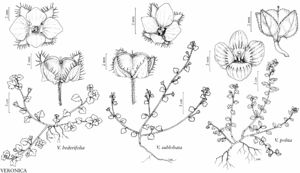Difference between revisions of "Veronica hederifolia"
Sp. Pl. 1: 13. 1753.
FNA>Volume Importer |
FNA>Volume Importer |
(No difference)
| |
Revision as of 18:31, 24 September 2019
Annuals. Stems decumbent to ascending, 5–40(–50) cm, eglandular-hairy. Leaves: blade suborbiculate, (3–)5-lobed, central lobe usually overtopping lateral ones, (5–)7–15(–20) × 8–16(–25) mm, base truncate, margins (3–)5-lobed, apex acute, surfaces sparsely eglandular-hairy. Racemes 1–10, terminal, 50–400(–500) mm, 5–20-flowered, axis eglandular-hairy; bracts suborbiculate, (3–)5-lobed, central lobe usually overtopping lateral ones, (5–)7–15(–20) mm. Pedicels patent or deflexed, (5–)9–15(–20) mm, equal to or ± shorter than subtending bract, length 2–3 times calyx, eglandular-hairy (in single line adaxially). Flowers: calyx lobes 5–6(–7) mm, apex acute, abaxial surface usually glabrous, ciliate with 25–35 hairs per side; corolla bright blue with bright white center, 5–7(–9) mm diam.; stamens sky blue, 0.7–1.2 mm; style (0.6–)0.7–0.9(–1.1) mm. Capsules ± round in cross section, ovoid, 3–4 × 4.5–6 mm, apex ± emarginate, glabrate. Seeds 1–4, bright yellow, ellipsoid to subglobular, urn-shaped, 2.3–3.3 × 2–3 mm, 1–2.2 mm thick, weakly cristate or rugose, ± smooth. 2n = 54 (Eurasia).
Phenology: Flowering (Feb–)Mar–Jun.
Habitat: Fields, lawns, gardens, ruderal places, vineyards, open forests, shady rocky places, dunes.
Elevation: 0–2000 m.
Distribution
B.C., Ont., Ala., Ark., Calif., Conn., Del., D.C., Fla., Ga., Ill., Ind., Kans., Ky., La., Md., Mich., Mo., Nebr., N.J., N.Y., N.C., Ohio, Okla., Oreg., Pa., S.C., S.Dak., Tenn., Utah, Va., Wash., W.Va., Eurasia.
Discussion
Selected References
None.
